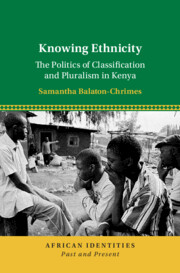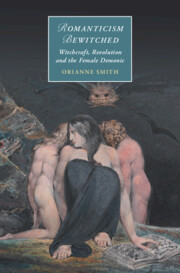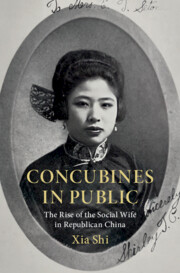Refine search
Actions for selected content:
3410549 results

Why is There Something Rather than Nothing?
- The Fundamental Problem of Ontology
- Coming soon
-
- Expected online publication date:
- April 2026
- Print publication:
- 30 April 2026
-
- Book
- Export citation

Political Lotteries and Democracy
- Coming soon
-
- Expected online publication date:
- April 2026
- Print publication:
- 30 April 2026
-
- Element
- Export citation

Popular Music and Football
- Coming soon
-
- Expected online publication date:
- April 2026
- Print publication:
- 30 April 2026
-
- Element
- Export citation

Fiction and Education in the Roman World
- The Cultivation of the Reader
- Coming soon
-
- Expected online publication date:
- April 2026
- Print publication:
- 30 April 2026
-
- Book
- Export citation

Knowing Ethnicity
- The Politics of Classification and Pluralism in Kenya
- Coming soon
-
- Expected online publication date:
- April 2026
- Print publication:
- 30 April 2026
-
- Book
- Export citation

Criminal Law Perspectives
- From Principles to Practice
- Coming soon
-
- Expected online publication date:
- April 2026
- Print publication:
- 30 April 2026
-
- Textbook
- Export citation

Romanticism Bewitched
- Witchcraft, Revolution and the Female Demonic
- Coming soon
-
- Expected online publication date:
- April 2026
- Print publication:
- 30 April 2026
-
- Book
- Export citation

Concubines in Public
- The Rise of the Social Wife in Republican China
- Coming soon
-
- Expected online publication date:
- April 2026
- Print publication:
- 31 May 2026
-
- Book
- Export citation
Judging Drugs
- Key Issues in Law and Society
- Coming soon
-
- Expected online publication date:
- April 2026
- Print publication:
- 30 April 2026
-
- Book
- Export citation

Translanguaging in Classroom Discourse
- Coming soon
-
- Expected online publication date:
- April 2026
- Print publication:
- 30 April 2026
-
- Element
- Export citation

Adaptations in the Life and Work of Director Tian Qinxin
- Coming soon
-
- Expected online publication date:
- April 2026
- Print publication:
- 30 April 2026
-
- Element
- Export citation

Theophrastus on First Principles
- Coming soon
-
- Expected online publication date:
- April 2026
- Print publication:
- 01 July 2027
-
- Element
- Export citation

Muslim Theological Encounters with Science
- Kaleidoscopes of Knowledge Over Time
- Coming soon
-
- Expected online publication date:
- April 2026
- Print publication:
- 30 April 2026
-
- Element
- Export citation

Intentional Strategies for Changing Character Traits
- Coming soon
-
- Expected online publication date:
- April 2026
- Print publication:
- 01 July 2027
-
- Element
- Export citation

Thomism Revisited
- Coming soon
-
- Expected online publication date:
- April 2026
- Print publication:
- 30 April 2026
-
- Book
- Export citation

Climate and Environment in the Southern Levant, 1300–300 BCE
- 1300–300 BCE
- Coming soon
-
- Expected online publication date:
- April 2026
- Print publication:
- 30 April 2026
-
- Element
- Export citation
Dyslexia and Working Memory
- A Scientific and Practical Lifespan Perspective
- Coming soon
-
- Expected online publication date:
- April 2026
- Print publication:
- 30 April 2026
-
- Book
- Export citation
Uncle Sam's Little Soldiers
- Patriotism, Mobilization, and the Americanization of Children, 1914–1918
- Coming soon
-
- Expected online publication date:
- April 2026
- Print publication:
- 31 May 2026
-
- Book
- Export citation

Heidegger’s Phenomenology
- Coming soon
-
- Expected online publication date:
- April 2026
- Print publication:
- 30 April 2026
-
- Element
- Export citation
An Ocean of Rumours
- News and Information in the Atlantic World
- Coming soon
-
- Expected online publication date:
- April 2026
- Print publication:
- 30 April 2026
-
- Book
- Export citation
